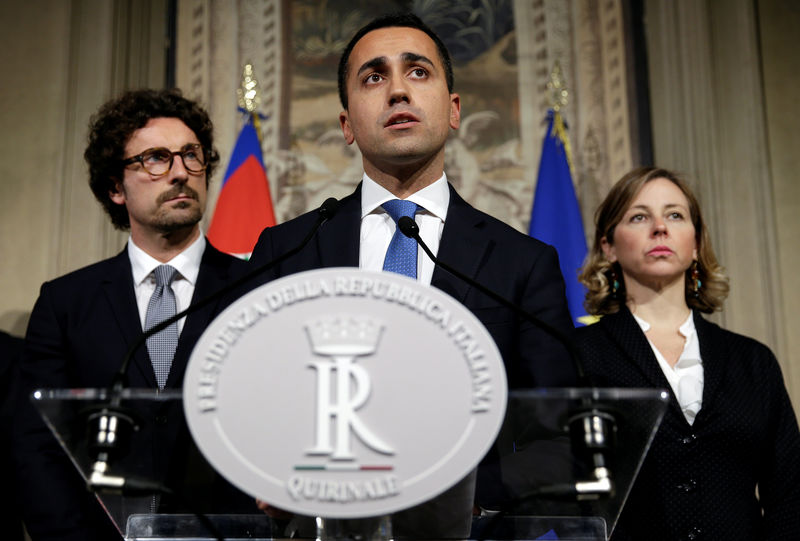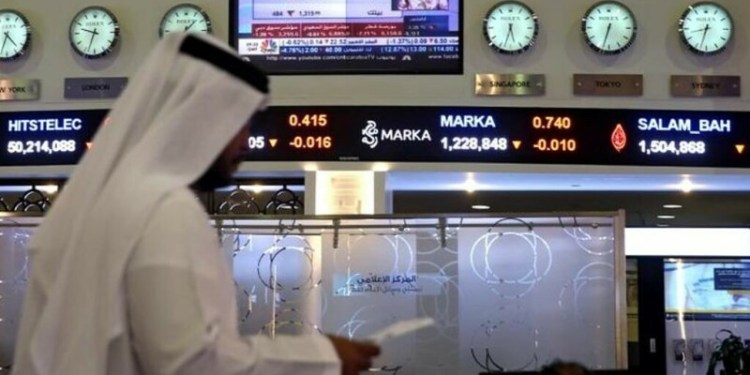 © Reuters. FILE PHOTO: Anti-establishment 5-Star Movement leader Luigi Di Maio speaks following a talk with Italian President Sergio Mattarella at the Quirinal Palace in Rome
© Reuters. FILE PHOTO: Anti-establishment 5-Star Movement leader Luigi Di Maio speaks following a talk with Italian President Sergio Mattarella at the Quirinal Palace in RomeBy Dhara Ranasinghe and Abhinav Ramnarayan
LONDON (Reuters) – Italian and Spanish borrowing costs fell sharply on Friday after anti-establishment parties in Italy revived a coalition deal, apparently averting snap elections, while in Spain socialist Pedro Sanchez took over as prime minister.
Efforts to end three months of political turmoil in Italy were the main focus, pushing peripheral euro zone bond yields down for a third straight day.
Italian two-year yields, which soared to five-year highs of more than 2.7 percent on Tuesday in a throwback to the euro debt crisis, retreated back to Monday’s levels at one stage.
The leaders of Italy’s right-wing League and the 5-Star Movement late on Thursday patched up their alliance after agreeing to substitute a eurosceptic they had initially proposed as economy minister but who was rejected by the head of state.
Yet the coalition deal still promises to increase spending and challenge European Union fiscal rules, policies that could limit any recovery in bond markets.
“We think the relief rally in Italian BTPs (bonds), stemming from the reduction in uncertainty in the near term, should prove short-lived,” said Antoine Bouvet, rates strategist at Mizuho International. “The fiscally profligate agenda remains.”
Italian two-year bond yields were down 35 basis points to 0.83 percent ().
Ten-year Italian bond yields were 27 bps lower at 2.56 percent (), well below multi-year peaks above 3 percent seen earlier this week.
To view a graphic on Italy’s 2-year bond yield, click: https://reut.rs/2Jm6oAc
GATHERING PACE
The yield gap over benchmark 10-year German bond yields tightened to 215 basis points from around 242 bps late Thursday. ()
Spanish and Portuguese yields fell with Italian peers, with demand for Spanish debt gathering pace on news of Pedro Sanchez’s takeover, which averted concerns that a parliamentary no-confidence vote in outgoing leader Mariano Rajoy would lead to snap elections.
“It’s a better outcome than fresh elections, as there’s less uncertainty, but the big picture is that Spain’s macro (economic) fundamentals are strong,” said Bouvet of Mizuho.
Bouvet said investors were also buoyed by comments from the new prime minister that he would keep the 2018 budget in place, so there would be no immediate adverse effect on Spain’s public finances.
Spain’s 10-year bond yield fell 16 bps to a two-week low of 1.33 percent (), while the yield spread over Germany tightened to 94 bps compared with Wednesday’s high of 134 bps.
()
“The situation in Spain is very different from Italy,” said Michael Metcalfe, head of global macro strategy at State Street Global Markets.
“The parties leading in the polls in Spain are centrists so we’re not getting the proposals for fiscal extremes as we have in Italy.”
The rally in southern European bond markets added to a sell-off in safer, top-rated bond markets in the region.
In Germany, the euro zone’s biggest economy, 10-year bond yields were up 7 basis points at 0.40 percent (), above 13-month lows touched earlier this week at 0.19 percent.
Source: Investing.com



























